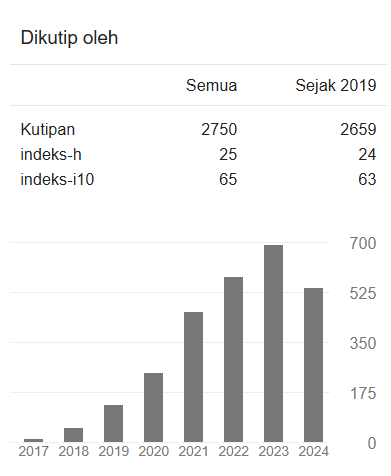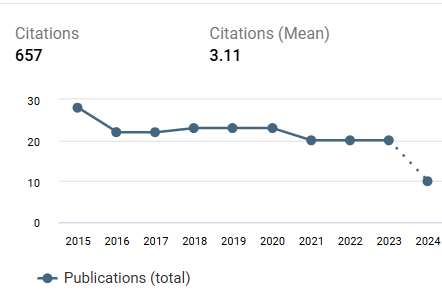Blended learning berbasis project-based learning untuk meningkatkan kemampuan berpikir kritis
DOI:
https://doi.org/10.22219/jinop.v7i2.10353Keywords:
Blended Learning, Project-Based Learning, Critical ThinkingAbstract
Today’s technology plays a critical role in human activities, including education. However, it is shown that the integration of technology into education did not improve students’ critical thinking skills. This study aims to determine the effect of blended learning through Edmodo based on project-based learning (PBL) to improve critical thinking skills. Quantitative approach was employed with a quasi-experimental method. Samples of this research were students of the undergraduate Biology Education Program, Universitas Muhammadiyah Malang. These samples took Learning Strategy subject with class A as the experimental group, and class B as the control group. Results show that blended learning based on PBL significantly improved students’ critical thinking skills.
Downloads
References
Akhmad, Y., Masrukhi, M., & Indiatmoko, B. 2020. The effectiveness of the integrated project-based learning model STEM to improve the critical thinking skills of elementary school students. Educational Management, vol 9, no 1. https://journal.unnes.ac.id/sju/index.php/eduman/article/view/35870
Allison, P., Gray, S., & Sproule, J. (2015). Exploring contributions of project-based learning to health and wellbeing in secondary education. SAGE Journals, 18(3). 207-220. Doi: https://doi.org/10.1177%2F1365480215599298.
Almulla, M.A. 2020. The effectiveness of the project-based learning (PBL) appriach as a way to engage students in learning. Sage journals, Doi: https://doi.org/10.1177/2158244020938702
Anderson, L.W., & Krathwohl, D.R. 2010. Kerangka landasan untuk pembelajaran, pengajaran, dan asesmen. Yogyakarta: Pustaka Pelajar.
Bakir, S., & Oztekin, E. 2014. Creative thinking levels of preservice science teachers in terms of different variables. Journal of Baltic Science Education. Vol 13 No 2 Page 231-242.
Barak, M., & Yuan, S. 2021. A cultural perspective to project-based learning and the cultivation of innovative thinking. Thinking Skills and Creativity, Vol 39. Doi: https://doi.org/10.1016/j.tsc.2020.100766
Brookhart, S.M. 2010. How to assess higher-order thinking skills in your classroom. Alexandria: ASCD.
Caceres, M., Nussbaum, M., Ortiz, J. 2020. Integrating critical thinking into the classroom: a teacher’s perspective. Thingking skills and creativity, vol 37. Doi: https://doi.org/10.1016/j.tsc.2020.100674
Din, M. 2020. Evaluating university students’ critical thinking ability as reflected in their critical reading skill: a study at bachelor level in pakistan. Thingking skills and creativity, vol 35. Doi: https://doi.org/10.1016/j.tsc.2020.100627
Dogara, G., Saud, M.S.B., Kamin, Y, B., Nordin, M.S.B. 2020. Project-based learning conceptual framework for integrating soft skills among students of technical colleges. IEEE Xplore, vol 8. Doi: https://doi.org/10.1109/ACCESS.2020.2992092
Goodsett, M. 2020. Best practices for teaching and assessing critical thinking in information literacy online learning objects. The journal of academic librarianship, vol 46, no 5. Doi: https://doi.org/10.1016/j.acalib.2020.102163
Gunawan, Sahidu, H., Harjono, A., & Suranti, N. M. Y. (2017). The Effect of Project Based Learning With Virtual Media Assistance on Student’s Creativity in Physics. Jurnal Cakrawala Pendidikan, 36(2), 167–179. Doi: https://doi.org/10.21831/cp.v36i2.13514
Hayati, W. I., Utaya, S., & Astina, I. K. (2016). Efektivitas student worksheet berbasis project-based learning dalam menumbuhkan kemampuan berpikir kritis siswa pada materi pelajaran geografi. Jurnal Pendidikan, 1(3), 468–474. Doi: https://doi.org/10.17977/jp.v1i3.6174
Lima, R. M., Dinis-Carvalho, J., Sousa, R., Arezes, P., & Mesquita, D. (2018). Project-Based Learning as a Bridge to the Industrial Practice. In Closing the Gap Between Practice and Research in Industrial Engineering (pp. 371-379). Springer, Cham. Doi: https://doi.org/10.1007/978-3-319-58409-6_41.
Martinez, P.P., Andujar, S.S. 2020. Development of competences in postgraduate studies of finance: A project-based learning (PBL) case study. International Review of Economics Education, Vol 35. Doi: https://doi.org/10.1016/j.iree.2020.100192
Marzuki. 2017. Pembelajaran tematik model webbed berbasis saintifik terhadap kemampuan berpikir tingkat tinggi di SD. Jurnal Sekolah Dasar Vol 26 No 2 Hlm 159-168. http://journal2.um.ac.id/plugins/generic/pdfJsViewer/pdf.js/build/pdf.worker.js
Novita, D., Darmawijoyo, D., & Aisyah, N. (2016). Pengembangan lks berbasis project-based learning untuk pembelajaran materi segitiga di kelas VII. Jurnal Pendidikan Matematika, 10(2), 1-12. Doi: https://doi.org/10.22342/jpm.10.2.3626.1-12.
Oktavia, Z., & Ridlo, S. 2020. Critical thinking skills reviewed from communication skills of the primary school students in STEM-based project-based learning model. Journal of Primary Education, vol 9, no 3. Doi: https://doi.org/10.15294/JPE.V9I3.27573
Purnomo, A., Ratnawati, N., & Aristin, N.F. 2016. Pengembangan pembelajaran blended learning pada generasi Z. Jurnal Teori dan Praksis Pembelajaran IPS. Vol 1 No 1 hal 70-77. http://journal.um.ac.id/index.php/jtppips/article/view/5853/2405
Renatovna, A.G., & Renatovna, A.S. 2021. Pedagogical and psychological conditions of preparing students for social relations on the basis of the development of critical thinking. Psychology and Education Journal, vol 58, no 2. Doi: https://doi.org/10.17762/pae.v58i2.2886.
Rohana, R.S., & Wahyudin, D. 2016. Project based learning untuk meningkatkan berpikir kritis siswa SD pada materi makanan dan kesehatan. Jurnal Penelitian Pendidikan, Vol 16, No 3, LPPM Universitas Pendidikan Indonesia. http://ejournal.upi.edu/index.php/JER/article/view/4817
Safaruddin, S., Ibrahim, N., Juhaeni, J., Harmilawati, H., & Qadrianti, L. 2020. The effect of project-based learning assisted by electronic media on learning motivation and science process skills. Journal of innovation in educational and cultural research, vol 1, no 1. Doi: https://doi.org/10.46843/jiecr.v1i1.5
Supriyatno, T., Susilawati, S., & Ahdi, H. 2020. E-learning development in improving students’ critical thinking ability. Cypriot Journal of Educational Sciences, vol 15, no 5, 1099-1106. Doi: https://doi.org/10.18844/cjes.v15i5.5154
Syakur, A., Musyarofah, L., Sulistiyaningsih, S., Wike, W., 2020. The effect of project-based learning (PjBL) continuing learning innovation on learning outcomes of english in higher education. Budapest International Research and Critics in Linguistics and Education (BirLE-Journal), Vol 3, No 1. Doi: https://doi.org/10.33258/birle.v3i1.860
Tsai, C. W., Shen, P. D., & Lin, R. A. (2015). Exploring the effects of student-centered project-based learning with initiation on students’ computing skills: a quasi-experimental study of digital storytelling. International Journal of Information and Communication Technology Education (IJICTE), 11(1), 17. Doi: https://doi.org/10.4018/ijicte.2015010102.
Umrzokova, G., & Pardaeva, S. 2020. Developing teachers’ professional competence and criticl thinking is a key factor of inreasing the quality of education. Mental Enlightenment Scientific-Methodological Journal, vol 2020, no 2. https://uzjournals.edu.uz/tziuj/vol2020/iss2/8/
Downloads
Published
How to Cite
Issue
Section
License
Copyright (c) 2021 Permana et al

This work is licensed under a Creative Commons Attribution 4.0 International License.
Copyright Notice
Authors who publish with JINoP (Jurnal Inoasi Pembelajaran) agree to the following terms:
- For all articles published in the JINoP (Jurnal Inovasi Pembelajaran), copyright is retained by the authors. Authors give permission to the publisher to announce the work with conditions. When the manuscript is accepted for publication, the authors agree to the automatic transfer of the publishing right to the publisher.
- Authors retain copyright and grant the journal the right of first publication with the work simultaneously licensed under a Creative Commons Attribution 4.0 International License. that allows others to share the work with an acknowledgment of the work's authorship and initial publication in this journal.
- Authors are able to enter into separate, additional contractual arrangements for the non-exclusive distribution of the journal's published version of the work (e.g., post it to an institutional repository or publish it in a book), with an acknowledgment of its initial publication in this journal.
- Authors are permitted and encouraged to post their work online (e.g., in institutional repositories or on their website) prior to and during the submission process, as it can lead to productive exchanges, as well as earlier and greater citation of published work (See The Effect of Open Access).








